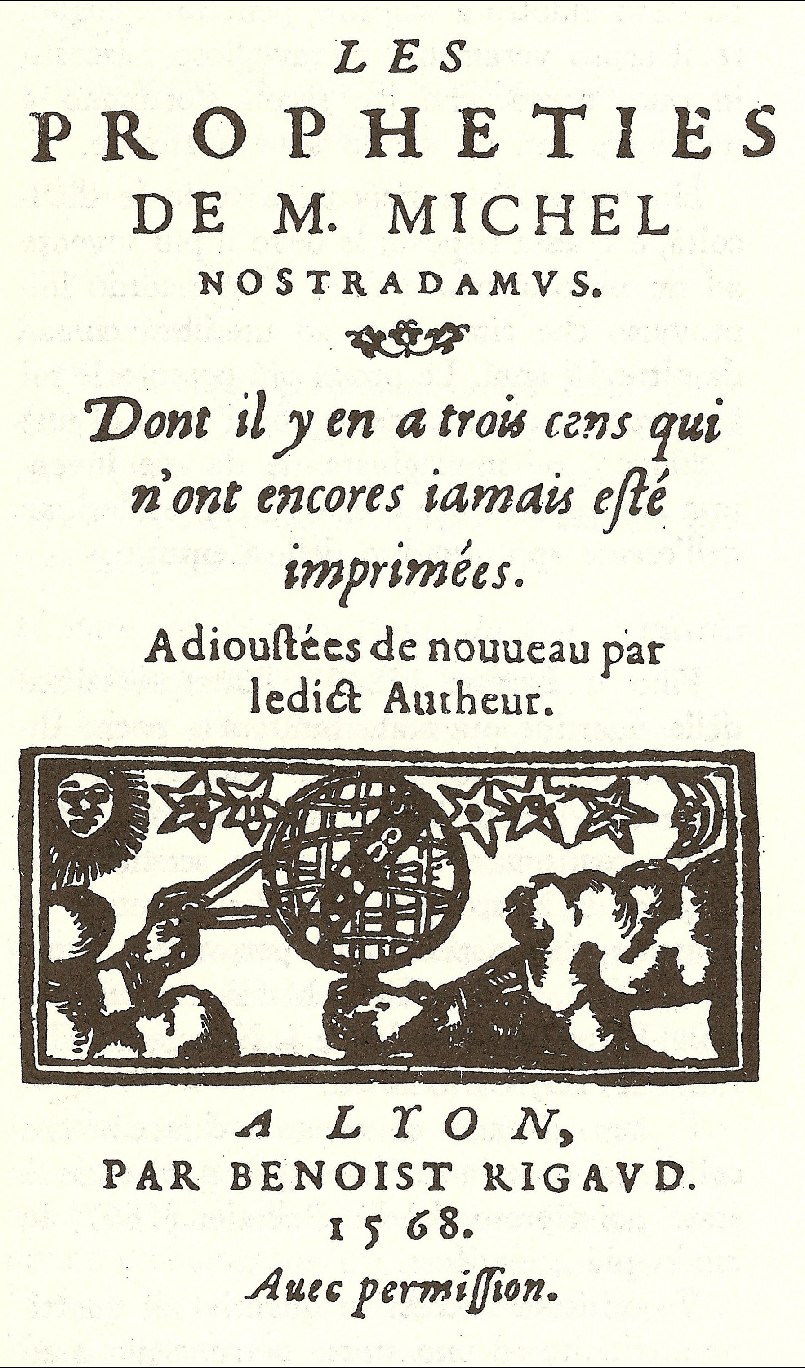Les Prophéties on:
[Wikipedia]
[Google]
[Amazon]
 ''Les Prophéties'' (''The Prophecies'') is a collection of prophecies by French physician
''Les Prophéties'' (''The Prophecies'') is a collection of prophecies by French physician
Full text of the Letter to King Henry II in English
{{DEFAULTSORT:Propheties 1555 books 1558 books 16th-century books in Latin 16th-century poetry books French books French-language works French poetry collections Greek-language books Henry II of France Nostradamus Occitan literature Prophecy
 ''Les Prophéties'' (''The Prophecies'') is a collection of prophecies by French physician
''Les Prophéties'' (''The Prophecies'') is a collection of prophecies by French physician Nostradamus
Michel de Nostredame (December 1503 – July 1566), usually Latinisation of names, Latinised as Nostradamus, was a French Astrology, astrologer, apothecary, physician, and reputed Oracle, seer, who is best known for his book ''Les Prophéti ...
, the first edition of which appeared in 1555 by the publishing house Macé Bonhomme. His most famous work is a collection of poems, quatrain
A quatrain is a type of stanza, or a complete poem, consisting of four Line (poetry), lines.
Existing in a variety of forms, the quatrain appears in poems from the poetic traditions of various ancient civilizations including Persia, Ancient India ...
s, united in ten sets of verses ("Centuries") of 100 quatrains each.
The first edition included three whole Centuries and 53 quatrains. The book begins with a preface, in the form of a message to his son César, followed by the Centuries themselves. The second edition was published in the same year and has minor differences from the first.
The third edition was published in 1557, and included the full text of the previous edition, supplemented by three more Centuries. The fourth edition was published two years after the death of the author, in 1568. It is the first edition to include all ten Centuries, as well as a second preface, the ''Letter to King Henry II''. However, quatrains 55 to 100 of the seventh Century were never completed.
The first English edition, titled ''The True Prophecies or Prognostications of Michael Nostradamus, Physician to Henry II. Francis II. and Charles IX. Kings of France'', was published in London by Thomas Ratcliffe and Nathaniel, in the year 1672.
The predictions do not follow chronological coherence and were written combining French, Greek
Greek may refer to:
Anything of, from, or related to Greece, a country in Southern Europe:
*Greeks, an ethnic group
*Greek language, a branch of the Indo-European language family
**Proto-Greek language, the assumed last common ancestor of all kno ...
, Latin
Latin ( or ) is a classical language belonging to the Italic languages, Italic branch of the Indo-European languages. Latin was originally spoken by the Latins (Italic tribe), Latins in Latium (now known as Lazio), the lower Tiber area aroun ...
and Occitan. It is believed that it contains anagrams, mythological and astrological references, in a subjective language that makes comprehension difficult. Some scholars claim that this was a resource used by Nostradamus to evade the Holy Inquisition, for fear of being persecuted for heresy
Heresy is any belief or theory that is strongly at variance with established beliefs or customs, particularly the accepted beliefs or religious law of a religious organization. A heretic is a proponent of heresy.
Heresy in Heresy in Christian ...
.
Most of the quatrains deal with disasters, and Nostradamus gained notoriety for the belief in his ability to predict the future.
References
Sources
* Leoni, E., ''Nostradamus and His Prophecies'' (Wings, 1961–82) * Lemesurier, P., ''The Nostradamus Encyclopedia'' (Godsfield/St Martin’s, 1997) * Lemesurier, P., ''Nostradamus – The Illustrated Prophecies'' (O Books, 2003) * Wilson, I., ''Nostradamus: The Evidence'' (Orion, 2002)/ ''Nostradamus: The Man Behind the Prophecies'' (St Martin's 2007)External links
*Full text of the Letter to King Henry II in English
{{DEFAULTSORT:Propheties 1555 books 1558 books 16th-century books in Latin 16th-century poetry books French books French-language works French poetry collections Greek-language books Henry II of France Nostradamus Occitan literature Prophecy